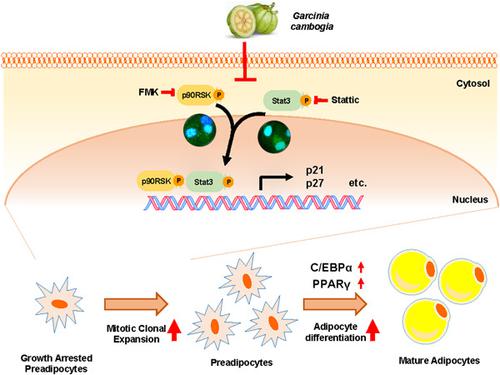当前位置:
X-MOL 学术
›
J. Cell. Physiol.
›
论文详情
Our official English website, www.x-mol.net, welcomes your
feedback! (Note: you will need to create a separate account there.)
Garcinia cambogia suppresses adipogenesis in 3T3-L1 cells by inhibiting p90RSK and Stat3 activation during mitotic clonal expansion.
Journal of Cellular Physiology ( IF 4.5 ) Pub Date : 2020-07-27 , DOI: 10.1002/jcp.29964 Joo-Hui Han 1 , Keun-Woo Jang 1 , Min-Ho Park 2 , Chang-Seon Myung 1
Journal of Cellular Physiology ( IF 4.5 ) Pub Date : 2020-07-27 , DOI: 10.1002/jcp.29964 Joo-Hui Han 1 , Keun-Woo Jang 1 , Min-Ho Park 2 , Chang-Seon Myung 1
Affiliation

|
Obesity is associated with an increase in adipose tissue, which is mediated by hyperplasia and hypertrophy. Therefore, inhibiting cell proliferation during mitotic clonal expansion (MCE) is one of the major strategies for preventing obesity. The antagonistic effects of Garcinia cambogia (G. cambogia) on obesity have been studied in animal experimental models. However, the effects of G. cambogia extract on MCE, and the underlying molecular mechanisms, are poorly understood. In this study, 3T3‐L1 cells were used to investigate whether G. cambogia extract affected cell proliferation during MCE and to identify target molecules for any anti‐adipogenic activity. G. cambogia extract suppressed isobutylmethylxanthine and dexamethasone‐and‐insulin (MDI)‐induced adipogenesis at an early stage by attenuating MCE. In G. cambogia extract‐treated preadipocytes, MDI‐induced cell proliferation and cell cycle progression were inhibited by G0/G1 arrest due to an increase in p21 and p27 expression, and inhibition of cyclin‐dependent kinase 2, cyclin E1 expression, and retinoblastoma (Rb) phosphorylation. In addition, the MDI‐induced phosphorylation and subsequent translocation into the nucleus of p90 ribosomal S6 kinase (p90RSK) and signal transducer and activator of transcription (Stat) 3 were suppressed. Specific inhibitors of p90RSK (FMK) and Stat3 (stattic) regulated cell proliferation and adipogenesis. In conclusion, this study demonstrated that G. cambogia extract inhibited MCE by regulating p90RSK, Stat3, and cell cycle proteins, leading to G0/G1 arrest. These findings provide new insight into the mechanism by which G. cambogia suppresses adipocyte differentiation and show that p90RSK is critical for adipogenesis as a new molecular target.
中文翻译:

藤黄果通过在有丝分裂克隆扩增过程中抑制 p90RSK 和 Stat3 激活来抑制 3T3-L1 细胞中的脂肪生成。
肥胖与脂肪组织的增加有关,脂肪组织由增生和肥大介导。因此,在有丝分裂克隆扩增(MCE)过程中抑制细胞增殖是预防肥胖的主要策略之一。的拮抗作用藤黄果(摹。果)对肥胖进行了研究,动物实验模型。然而,G的影响。对 MCE 的柬埔寨提取物及其潜在的分子机制知之甚少。在这项研究中,3T3-L1 细胞用于研究G . 柬埔寨提取物影响 MCE 期间的细胞增殖,并确定任何抗脂肪生成活性的靶分子。格。柬埔寨提取物通过减弱 MCE 在早期抑制异丁基甲基黄嘌呤和地塞米松和胰岛素 (MDI) 诱导的脂肪生成。在G。G 0 /G 1抑制了柬埔寨提取物处理的前脂肪细胞、MDI 诱导的细胞增殖和细胞周期进程由于 p21 和 p27 表达的增加以及细胞周期蛋白依赖性激酶 2、细胞周期蛋白 E1 表达和视网膜母细胞瘤 (Rb) 磷酸化的抑制而导致停滞。此外,MDI 诱导的磷酸化和随后转位到 p90 核糖体 S6 激酶 (p90RSK) 和信号转导和转录激活因子 (Stat) 3 的细胞核中受到抑制。p90RSK (FMK) 和 Stat3 (stattic) 的特异性抑制剂可调节细胞增殖和脂肪生成。总之,这项研究表明G . 果提取物抑制MCE通过调节P90RSK,STAT3,和细胞周期蛋白,从而导致至G 0 / G 1个停滞。这些发现为G的机制提供了新的见解。柬埔寨 抑制脂肪细胞分化并表明 p90RSK 作为新的分子靶标对脂肪生成至关重要。
更新日期:2020-07-27
中文翻译:

藤黄果通过在有丝分裂克隆扩增过程中抑制 p90RSK 和 Stat3 激活来抑制 3T3-L1 细胞中的脂肪生成。
肥胖与脂肪组织的增加有关,脂肪组织由增生和肥大介导。因此,在有丝分裂克隆扩增(MCE)过程中抑制细胞增殖是预防肥胖的主要策略之一。的拮抗作用藤黄果(摹。果)对肥胖进行了研究,动物实验模型。然而,G的影响。对 MCE 的柬埔寨提取物及其潜在的分子机制知之甚少。在这项研究中,3T3-L1 细胞用于研究G . 柬埔寨提取物影响 MCE 期间的细胞增殖,并确定任何抗脂肪生成活性的靶分子。格。柬埔寨提取物通过减弱 MCE 在早期抑制异丁基甲基黄嘌呤和地塞米松和胰岛素 (MDI) 诱导的脂肪生成。在G。G 0 /G 1抑制了柬埔寨提取物处理的前脂肪细胞、MDI 诱导的细胞增殖和细胞周期进程由于 p21 和 p27 表达的增加以及细胞周期蛋白依赖性激酶 2、细胞周期蛋白 E1 表达和视网膜母细胞瘤 (Rb) 磷酸化的抑制而导致停滞。此外,MDI 诱导的磷酸化和随后转位到 p90 核糖体 S6 激酶 (p90RSK) 和信号转导和转录激活因子 (Stat) 3 的细胞核中受到抑制。p90RSK (FMK) 和 Stat3 (stattic) 的特异性抑制剂可调节细胞增殖和脂肪生成。总之,这项研究表明G . 果提取物抑制MCE通过调节P90RSK,STAT3,和细胞周期蛋白,从而导致至G 0 / G 1个停滞。这些发现为G的机制提供了新的见解。柬埔寨 抑制脂肪细胞分化并表明 p90RSK 作为新的分子靶标对脂肪生成至关重要。











































 京公网安备 11010802027423号
京公网安备 11010802027423号